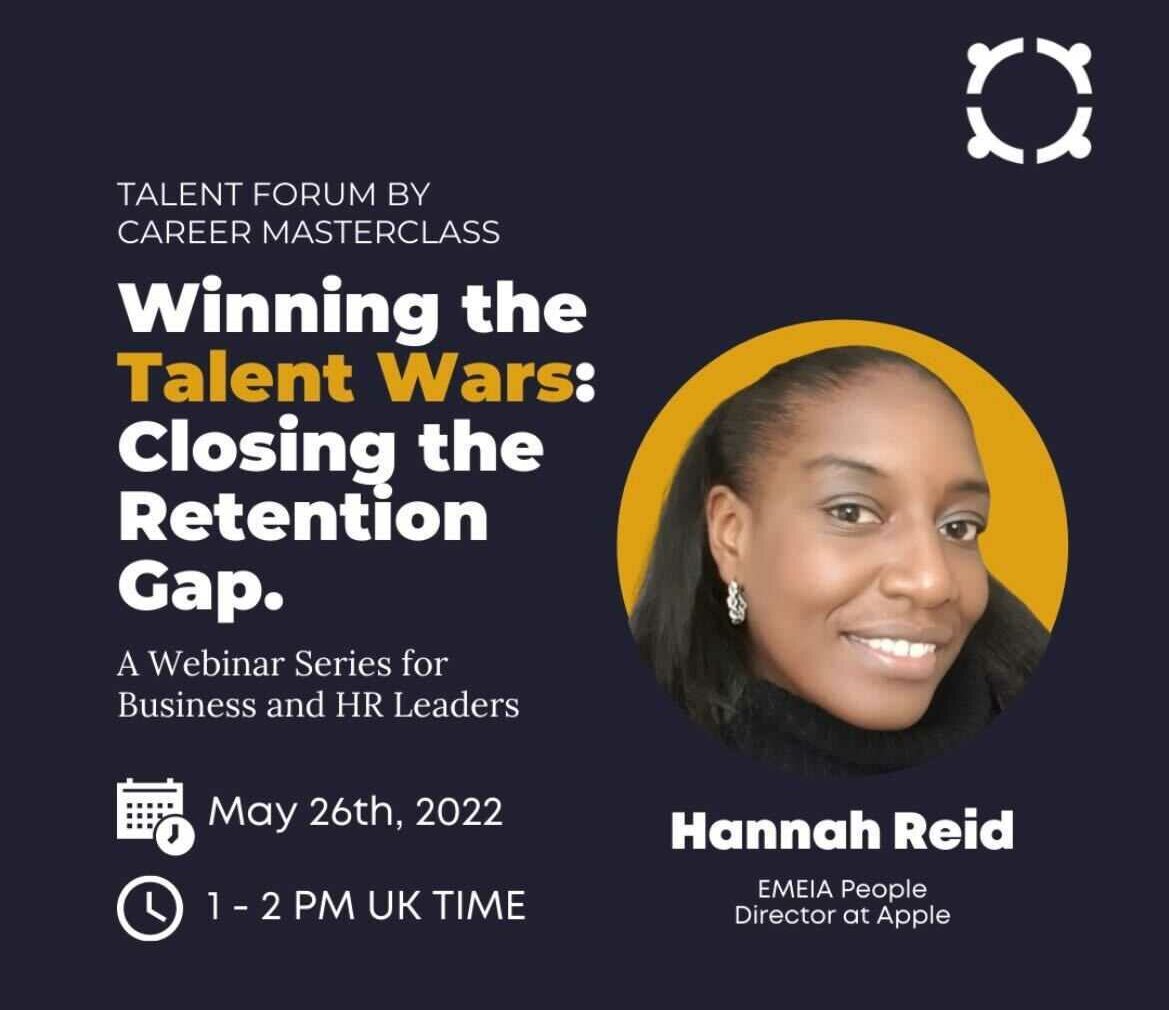“Most progressive firms are past the point of buy-in; we are in a war for talent so anyone showing up late to battle will not come out victorious.”
5 Questions with Hannah Reid, People Director EMEIA at Apple
After a successful career in the public sector- and one of the highest-ranking Black civilian women in the public sector while still in her twenties, Hannah Reid decided it was time to move to the private sector and expand her skill set. This she equally did remarkably, particularly at Oliver Wyman where she was Regional Head of HR, and later at Gartner as a senior director. During this period, she was recognised as a top three senior leader at the Black British business awards and the top 100 most influential black women at the Black magic gala.
It was during her time at Gartner that she was approached by Apple. She thought it was time for her to pursue the next phase of her career and made the tough decision to leave.
Not one to shy away from speaking out about Black representation at the top, she embodies it and pays it forward by coaching ethnically diverse women in leadership positions to increase their self-awareness and improve their confidence. In her words, “you cannot outperform your own level of self-esteem.”
She attributes her success to her family. According to her, “my two wonderful boys and an amazing husband have been pivotal to my success in my 19-year journey.”
We caught up with Hannah Reid ahead of our webinar to discuss diversity and inclusion, talent attraction and retention strategies.
1. How would you suggest getting senior management buy-in on strategies for attracting, developing and retaining diverse talent?
Most progressive firms are past the point of buy-in; we are in a war for talent so anyone showing up late to battle will not come out victorious. This is more about contracting internally to decide what you ultimately want to achieve. Often, the desire is simply to rely on recruitment to solve the problem. With that approach, it would take a lifetime before you would see a material change. You only need to look at the average attrition rates for the U.K. at 15% which would mean that every year, every single hire needs to be diverse and that no diverse talent resigns when we know that in reality, more diverse hires tend to leave. Those rates do not typically apply to more senior leadership, which we know also drives diverse hiring. This is just as much about culture, inclusion, development/investment, empathetic leadership, great benefits, talent planning and community to strengthen retention as it is about recruitment.
2. Trust has been the bane of D&I initiatives by organisations. How should talent teams address the lack of trust ethnically-diverse staff have in their leadership?
Be honest with yourselves as an organisation. For example, are you ready to change your operating model to develop an acceleration plan for talent? If you are not, how do you intend to show tangible results for developing diverse talent? Are you recycling expertise in how to do this or investing/outsourcing to create systemic change? Either way, that level of honesty is what both internal and external talent struggle with. If I’m promised development and get none, it carries a different connotation for my career as it stagnates growth, particularly when others for whom the system was designed to thrive. From that, trust gets broken.
Many initiatives feel disingenuous with no long-term strategy for the ultimate goal. It is important first to understand why there is even a need for this psychological contract to then understand the importance placed on leaders to deliver on it.
3. What’s your favourite way to unwind?
I cannot stress how important it is to make time for yourself. One of my best tips for early leaders is learning to say no, as in the end ‘time is all we have’ – Steve Jobs.
I like to do a variety of things but mostly be away from distractions and either play a game with my husband and kids or talk to them about their day/week. I also love comedy. Laughter is a great way for instant endorphins, as long as it’s a great comedian. Going for a walk even around the garden whilst listening to music is therapeutic for me. Or after an intense week, a workout is a great way to shake it off. I always feel good afterwards.
4. If you could meet one person, living or dead, who would that person be and why?
My grandfather (on my mother’s side). He died in Ghana before I was born and was an inspirational man from all the stories my mother described. A war veteran, a passionate family man who instilled values and attributes in my mother that she passed on to me and that have helped me become the person I am today. That I can pass this learning on to my children fills me with such pride. That’s a legacy!
5. What are you watching?
I just finished a 3-part drama by BBC studios called Time. It’s about a man who goes to jail for killing a man with his car whilst under the influence of alcohol. It’s incredibly well filmed and directed. Such a raw insight into life in prison and what it does to people who lead ordinary lives until that point in juxtaposition with serial felons. Gripping!
If you enjoyed Hannah’s answers and want to hear her perspectives on how organisations can bolster their attraction and retention strategies to remain competitive in 2022 and beyond, watch the replay of our Talent Forum webinar here.
 All articles
All articles